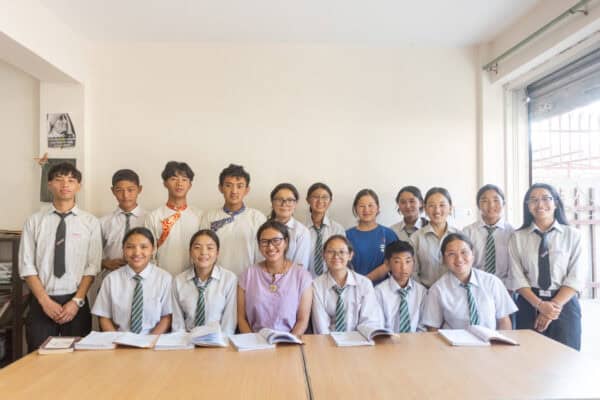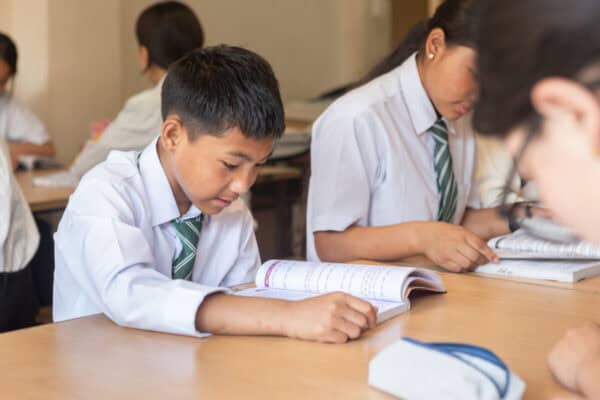The Boudha Youth Hostel was established in 2022 as part of Tsoknyi Rinpoche’s educational initiative to support students from the Himalayas. More than just a place to stay, the hostel provides safe housing, nutritious meals, skill-building opportunities, and meaningful care. For many students who have no family in Boudha during school holidays, it has become a true home away from home. We spoke with Raissa DiStefano, who manages the hostel, about its role in shaping the lives of these young people.
Raissa DiStefano has lived in Nepal for twelve years, bringing experience in human resources, counseling, and project management to her work. Before joining this project, she spent seven years with a street children’s initiative. A student of Tsoknyi Rinpoche since 2006, Raissa first became involved with the Boudha Youth Hostel alongside Fionnuala Shenpen Daffy to assist with hiring, and has since become a pivotal force in supporting the children’s growth and well-being.
In Conversation with Raissa DiStefano
Interviewer: What would you say is the primary mission of HCEP?
Raissa: HCEP works to provide children from Samagaun village in the Nubri region of Nepal access to education and a chance at a better future. In the village, there’s only a primary school, and after class 5, there are no options for secondary education. Mingyur Rinpoche started the kindergarten, and Tsoknyi Rinpoche stepped in to support the primary school. After grade 5, students can continue studies in Kathmandu until grade 12.
Tsoknyi Rinpoche with some of the students
Interviewer: How did you come to be part of this work?
Raissa: I started in 2017, but I’d been working with street children in Kathmandu since 2012. My background in project management and HR helped me support Fionnuala Shenpen Daffy in setting up human resources and hiring staff. Before Rinpoche got involved, some children found sponsors through tourists, but it wasn’t sustainable or available for all families. Rinpoche created something structured and families no longer had to rely on chance encounters with sponsors.
Interviewer: How do you help students beyond academics?
Raissa: We really emphasize teaching life skills. We start with practical things: managing small amounts of money to buy groceries, crossing busy streets safely, and navigating public transport. Hygiene is another essential skill. These kids come from villages without health posts, so we teach them to recognize when they’re sick, how to ask questions at the doctor’s, and how to care for themselves. A lot of the work is about giving them confidence and self-efficacy.
They are in school six days a week so on Saturdays, they get downtime—reading, relaxing, or watching documentaries or a favorite movie, like Aladdin, Mulan or Harry Potter. Some of our students who struggle with Tibetan get tutored on Saturdays, as well. I’m teaching two of the older students accounting—how to manage bills, spreadsheets, and finances. I try to include the students in these ways so they leave here with practical skills. These are complementary skills to their studies in management too.

Interviewer: How do you help students maintain their cultural roots?
Raissa: Cultural grounding is so important. Even in Kathmandu, they celebrate their festivals, practice Tibetan language, and stay connected to their community. Tsoknyi Rinpoche speaks about essence love—a sense of warmth and well-being that is steady, no matter the external circumstances. These children may come from villages with little, but they are rich in essence love. That love, that cultural rootedness, stays with them as well.
Interviewer: What challenges do you face in this work?
Raissa: Fundraising can be a challenge. Food transport to the villages is a large expense—everything has to be brought to these remote places because growing food there is so difficult. Another challenge can be engagement—especially with the younger kids. Many struggle to connect with academics, but I think that’s natural at a younger age. We don’t give up on them because we know that, over time, they blossom. You just have to be patient and keep encouraging them.
Interviewer: What are some of the students’ aspirations?
Raissa: They’re so varied. Some want to be tour guides, some are drawn to nursing and hope to return to their villages to provide medical assistance. One of the challenges while the children are at home is that their parents, who often didn’t have opportunities for education themselves, struggle to advise them about career paths. That’s sort of where we can guide them. Currently we need funding for two students who want to continue their studies in grade 11 & 12, to study science and then into nursing.
Sonam Choden & Tsering Bhuti Lama
Two of our students who aspire to go into nursing
The impact of your support extends far beyond one child—it reaches families, strengthens communities, and breaks the cycle of poverty for generations to come.
Interviewer: How do you gauge the effectiveness of the schools you partner with?
Raissa: We look at their academic progress, of course, but we also listen—how they feel about their teachers, how they handle stress. If they seem unhappy before and after school we inquire more and see what may be going on. We encourage them to speak directly with their teachers when they have problems—learning to advocate for their needs is part of their education. One school introduced daily journaling, and the students loved it so much they brought the practice back to the hostel. It’s little things like that that tell me a school is doing something right.
Interviewer: How can people best support this work?
Raissa: Individual sponsorships is very important. Connecting a sponsor with a child and supporting them throughout their education. Volunteers, too—especially those willing to teach English or lead enrichment activities like art, dance, theatre, etc. Support for their higher education beyond grade 12 as well. When students, like our aspiring nurses, want to give back to their communities, we need the funding to make those things possible.
Interviewer: What is your hope for the future of this work?
Raissa: I’d love to see some become teachers, others health workers—people who change their villages from within. This isn’t short-term work. It’s generational. And as long as there are children in Samagaon, we will be here.


